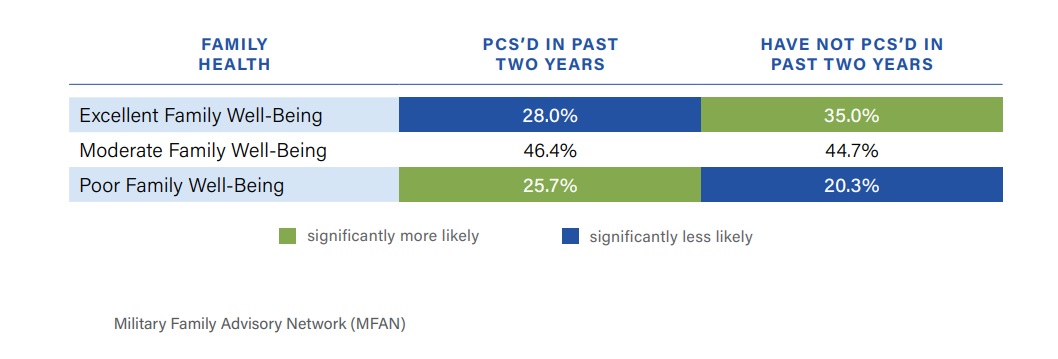PCS moves leave families with unreimbursed expenses
Some military families don't file moving expenses claims when they get to the gaining installation as reimbursement processes are still difficult to navigate.
Moving to a new base every few years is a familiar part of military life for many. However, military families still report between $500 and $1,000 in unreimbursed moving expenses, which causes them to dip into their savings or accrue credit card debt.
Those unreimbursed moving expenses include anything from temporary lodging to rental vehicles to utility or security deposits. The reimbursement processes are still difficult to navigate with only 70.5% of respondents filing claims for reimbursement once they reach their duty stations. About 43% of service members and their families report it takes up to two months for their reimbursement to come in.
“Anecdotally, we hear from a lot of military families that reimbursement processes are both difficult to navigate and a very large lift when they get to the gaining installation on top of the things they’re already doing, including getting kids enlisted in schools, finding permanent addresses, those kinds of things. So reimbursement processes can be difficult to navigate,” Gabby L’Esperance, Military Family Advisory Network’s director of insights, told Federal News Network.
“We’re also seeing more and more often that service members are being deployed within 30 days of arriving at their gaining installation. And once a service member is deployed, those reimbursement processes become even more difficult to navigate than they normally would be, which contributes to that nearly 30% of folks who didn’t submit a reimbursement claim.”
The Military Family Advisory Network, a non-profit organization that supports and advocates for military families, has been conducting its military family support programming survey since 2013, examining a wide range of issues from housing to food insecurity, to financial readiness, healthcare, personal well-being, relationships, marriage, as well as retention and recruitment. MFAN received more than 10,100 responses last year, making the 2023 survey the largest to date.
“Every year, we rebuild our survey from the ground up, hearing from stakeholders from every sector, from military families themselves, to really understand what kind of information is needed and build a survey that would allow us to achieve that kind of data and information. Our survey really focuses on support programming needs,” said L’Esperance.
The survey found that military families are struggling to find housing due to long housing waiting lists, making families rely on temporary lodging, which adds to the financial impact of a Permanent Change of Station (PCS) move. While 33.7% of service members and their families 33.7% report staying in temporary housing for less than ten nights, 29.2% said they stayed in temporary housing between 11 to 30 nights. And about 20.6% of families reported spending between 31 to 60 nights at temporary lodging.
“We also know that when they’re having trouble finding places to live, that temporary lodging isn’t lasting long enough. And we also know that people like enlisted service members and families are more likely to experience things like housing burden once they are in housing because they’re paying more than 30% of their combined household income, including [Basic Allowance for Housing] and allowances on housing, rent, utilities and mortgage,” said L’Esperance.
As for support needed during PCS moves, military families said they want better communication from their gaining installations, as well as additional assistance navigating the housing market, moving pets and accessing language resources for moves outside the continental United States. Military families also expressed a need for more high-quality movers and more hands-on support from the military during the packing and moving process.
“There’s a lot of challenges. We’ve heard about people having damaged goods and those kinds of things during moves, which are at times inevitable. But one of the things that people are really pushing for is higher quality movers and moving companies,” said L’Esperance.
Broadly, ongoing challenges like housing, healthcare and childcare still persist, said L’Esperance, but there is a positive trend in the number of military families accessing mental healthcare services.
While it appears that more military families are taking advantage of mental health services available to them, survey respondents who recently moved to a new base report worse family health than families who had not moved in the past two years.
About 37% of respondents said moving had a negative effect on their family’s mental health and overall well-being, causing stress, depression, anxiety and even adjustment disorder. Around 19% of families suggested their relationships with their extended families are strained due to lack of connection.

Families choosing geobaching
While families that decide to live separately from their spouses choose to do so for reasons such as military spouse employment and children’s education, service members are likelier to report poor family well-being.
“When we think about the benefits of doing that, it is the stability. The downsides are things like having to support two households,” said L’Esperance.
The survey also showed that officer families are more likely to geobach than enlisted families, and Navy and Coast Guard families are more likely to geobach than other military services.
Nearly Useless Factoid
Service members are typically given Permanent Change of Station (PCS) orders every two to three years.
Source: todaysmilitary
Copyright © 2025 Federal News Network. All rights reserved. This website is not intended for users located within the European Economic Area.






